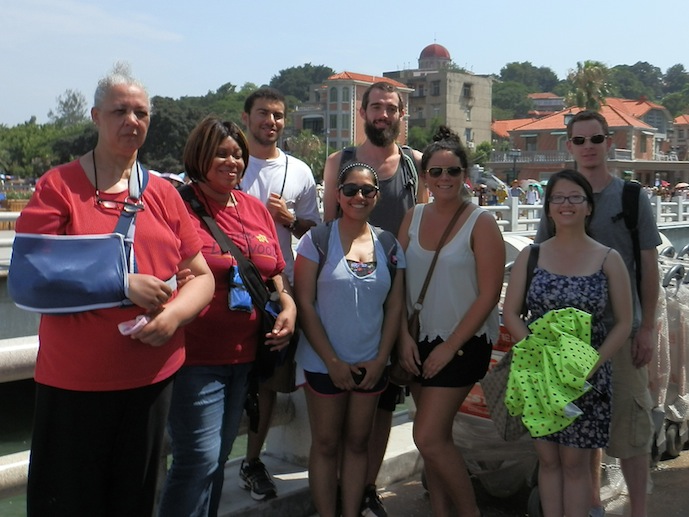Imagine studying abroad as a visually impaired student — learning about new cultures, languages and people, while adapting to an unfamiliar host university. This was UNC Charlotte psychology major Taneka Robertson’s experience this summer during a study abroad trip to Xiamen, China.
“Since I am visually impaired and I have some friends that are visually impaired, we have never been out of the country,” Robertson said. “I wanted to experience it from a blind standpoint and tell them what it was like.”
Robertson was part of a small group of students who studied for three weeks at a University of Xiamen satellite campus. Dr. Maria-Carla Chiarella, a psychology professor, led the study abroad trip. Students took courses such as Chinese language, calligraphy, Kung Fu, and psychology while engaging in the Chinese culture.
“Since I am visually impaired, I had to alter my class schedule,” said Robertson. “I took the Chinese language course, psychology, and some calligraphy. Due to my condition, it was very difficult to take calligraphy and Kung Fu; therefore I took historical Chinese classes instead.”
The culture, the campus, and the climate provided contrasts to the experiences in the United States of Robertson and the other students.
“We are used to Wi-Fi and air conditioning in all of the rooms; they did not have that luxury,” Robertson said. “It was very hot. The dorm layout was different. They had a patio bathroom, which is very different than we are used to. There was a huge language barrier. I had to depend on my aunt as a visual aid, and I had to depend on a translator and my teacher assistants.
As a faculty leader, Chiarella taught the UNC Charlotte students cross-cultural psychology with an emphasis on China and U.S. and China cultural differences. The professor attended other classes with the students, which allowed her to gain an insight into the Chinese learning experience.
“There were so many differences in the people and how things worked, but all of the students were outstanding in such a challenging setting,” Chiarella said. “The culture was fascinating. I felt like we were genuinely experiencing the culture together since none of us had been there, with the exception of one student. Watching the students engage in such a distinctly foreign situation and handle it so well, gave me a lot of pride in our students.”
Robertson shared her thoughts in a final reflection paper for Chiarella’s cross-cultural studies course. She told of packing the essentials — her umbrella, an electronics charger and some Mandarin phrases she had learned in class. Another thing she carried with her was her openness to new experiences.
“The most rewarding thing about the trip was actually being immersed in the culture,” she wrote. “I would recommend before going abroad to fellow students to research the host country, be able to speak some of the language and be prepared for the unexpected. I would recommend this experience because students have a firsthand exposure to the host country’s culture, food, and daily routines of the citizens.”
Words: Brittany Algiere, CLAS Communications Office, Student Communications Assistant
Image: Courtesy of Maria-Carla Chiarella








